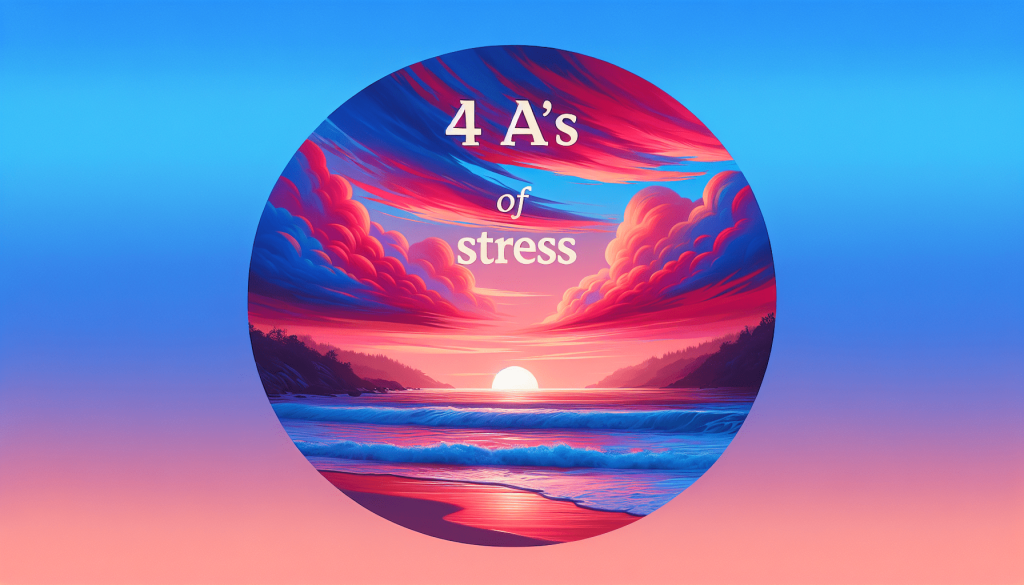What Are The 4 A’s Of Stress Management?
In this article, you will discover the secrets to effective stress management by learning about the 4 A’s. These important principles provide practical strategies to help you navigate and reduce stress in your life. By understanding and implementing these 4 A’s, you will discover new ways to approach and manage stress, ultimately leading to a more balanced and fulfilling life. So, let’s dive into the world of stress management and explore these invaluable tools together!

Awareness
Recognizing stress signals
Being aware of the signs and signals that indicate you are experiencing stress is an essential first step in managing it effectively. Stress can manifest in various ways, both physically and emotionally. You may notice changes in your body, such as increased heart rate, muscle tension, or difficulty sleeping. Emotionally, you might feel irritable, anxious, or overwhelmed. By paying attention to these signals, you can begin to identify when stress is present in your life.
Identifying triggers
Understanding the specific triggers that lead to your stress is another crucial aspect of awareness. Triggers can be external factors, such as work deadlines, relationship conflicts, or financial pressures. They can also be internal, like negative self-talk or unrealistic expectations. By recognizing what triggers your stress, you gain insight into the areas of your life that may need attention. This knowledge enables you to proactively address and minimize these triggers.
Understanding the effects of stress on the body
Stress impacts not only your mental well-being but also your physical health. When faced with stress, your body releases stress hormones, such as cortisol and adrenaline, which can affect various systems in your body. Prolonged exposure to these hormones can lead to increased blood pressure, weakened immune function, and digestive issues, among other health concerns. By understanding how stress affects your body, you can take steps to mitigate its negative impact.
Acceptance
Acknowledging the presence of stress
Accepting that stress is a part of life is an important mindset shift. Rather than viewing stress as solely negative, recognizing its presence can help you navigate it more effectively. Stress can serve as a signal that something needs attention or change in your life. By acknowledging its presence, you open yourself up to finding healthier ways to manage and respond to stress.
Understanding that stress is a normal part of life
It is crucial to recognize that stress is a natural and inevitable part of being human. Everyone experiences stress at some point in their lives, and it can arise from various sources. It is essential not to judge yourself for feeling stressed but instead embrace it as a normal part of the human experience. This acceptance can help reduce the added pressure of feeling guilty or inadequate for experiencing stress.
Letting go of resistance to stress
Resisting or fighting against stress only amplifies its negative effects on your well-being. Instead of struggling against it, try adopting a mindset of acceptance and resilience. Embracing stress as an opportunity for growth and learning can help you reframe your relationship with it. By letting go of resistance, you can focus on developing effective strategies to manage and cope with stress.

Adaptation
Implementing coping strategies
Coping strategies are techniques and behaviors that help you navigate and reduce stress. These strategies can vary from person to person, depending on individual preferences and needs. Some common coping strategies include deep breathing exercises, mindfulness meditation, engaging in physical activity, practicing relaxation techniques, and seeking support from loved ones. It is important to explore different coping strategies to find the ones that work best for you.
Making lifestyle changes
Certain lifestyle factors can contribute to increased stress levels. Assessing and making changes to your daily routine can help reduce stress in your life. This may involve prioritizing self-care activities, such as getting enough sleep, eating a balanced diet, and engaging in regular exercise. Additionally, making time for hobbies, relaxation, and social activities can provide much-needed stress relief. By making intentional choices to take care of yourself, you can create a healthier and more balanced lifestyle.
Building resilience
Resilience is the ability to bounce back from adversity and cope with stress effectively. Building resilience involves developing skills and attitudes that can help you navigate challenging situations. This can include cultivating a positive mindset, practicing gratitude, fostering supportive relationships, setting realistic goals, and maintaining a sense of humor. By actively working on building resilience, you can enhance your ability to cope with stress and navigate life’s ups and downs more effectively.

Action
Taking proactive steps to manage stress
Managing stress requires proactive action instead of passively waiting for it to resolve on its own. This involves taking control of your life and making intentional choices to address stressors. It may involve setting boundaries, practicing time management, delegating tasks, or seeking professional help when needed. By taking proactive steps, you are better equipped to manage stress in a way that promotes your overall well-being.
Setting goals and priorities
Setting clear goals and priorities can help you stay focused and prevent stress from overwhelming you. Identify what is most important to you and what you want to achieve in your life. Break down your goals into smaller, manageable steps, and create a plan to work towards them. By setting priorities, you can allocate your time and energy in a way that aligns with your values and reduces stress caused by competing demands.
Seeking support from others
No one should face stress alone. Seeking support from others can provide you with a valuable network of people who can offer guidance, encouragement, and understanding. Reach out to trusted friends, family members, or professionals, such as therapists or counselors, who can provide guidance and support during challenging times. Sharing your experiences and seeking assistance can lighten the burden of stress and help you find new perspectives and solutions.
In conclusion, managing stress effectively involves awareness, acceptance, adaptation, and action. By recognizing the signs of stress, identifying triggers, and understanding its impact on the body, you can develop awareness and take proactive steps to manage it. Accepting stress as a normal part of life and letting go of resistance enables you to navigate stress more effectively. Through implementing coping strategies, making lifestyle changes, and building resilience, you can adapt to stress and its challenges. Finally, taking action by setting goals, priorities, and seeking support from others empowers you to manage stress and promote your overall well-being. Remember, you have the ability to take control of stress and lead a healthier and more fulfilling life.








